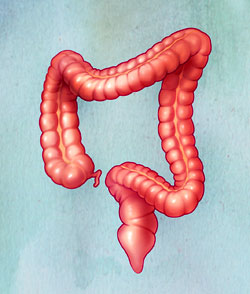 This is a benign condition caused by diverticula or balloon-like pockets or crevices that develop in the weak points of the bowel wall, usually the colon. These pockets can cause discomfort, diarrhea and/or constipation. About half of all Americans aged 60 to 80 (and nearly everyone over 80 years of age) have diverticulosis. The pockets develop because of the pressure exerted within by the contracting colon.
This is a benign condition caused by diverticula or balloon-like pockets or crevices that develop in the weak points of the bowel wall, usually the colon. These pockets can cause discomfort, diarrhea and/or constipation. About half of all Americans aged 60 to 80 (and nearly everyone over 80 years of age) have diverticulosis. The pockets develop because of the pressure exerted within by the contracting colon.
Diverticulitis is a complication of diverticulosis that occurs when a tiny hole in a diverticulum or pocket allows bacteria in the colon to seep through its wall and cause inflammation or infection outside the colon. It can be painful and may require surgery and is more prevalent in patients over age 80.
Both conditions may be treated successfully through diet, medication and/or surgery.
FAQs
With diverticulosis, few symptoms are noticeable, except perhaps for intermittent, spastic discomfort in the left lower abdomen. One complication can also be bleeding from blood vessels in the diverticula, which can cause a gush of blood from the rectum or black stools.
Symptoms of diverticulitis include lower abdominal pain, nausea, vomiting and occasionally, constipation. Symptoms may be mild with only slight discomfort in the left lower abdomen or they may be extreme, with severe tenderness and fever. The condition may also be accompanied by abdominal abscesses or colon blockage.
Diverticulosis can be discovered during a barium enema or colonoscopy. Most people are asymptomatic and will never be aware that they have this condition.
Your medical history is the physician’s most important tool in diagnosing diverticulitis. It can also be detected through a physical exam or by using diagnostic tools such as a CT scan X-ray, a barium enema x-ray, or a flexible sigmoidoscopy or colonoscopy.
Diverticulosis may be prevented if treated early in life. Fiber, bran and roughage can help ‘bulk’ and soften stools, reducing pressure in the colon over time. Bulking agents such as psyllium and methylcellulose are available over the counter and can also be effective. Medications can be used to decrease spasms in the colon along with lessening of emotional stress, which is known to cause spasms and possibly the formation of diverticula.
Diverticulitis requires antibiotics and resting of the bowel by avoiding food or, at times, even liquids. For severe cases, recurrent episodes or when diverticulitis occurs at an early age, surgery may be needed to remove the diseased portion of the colon.